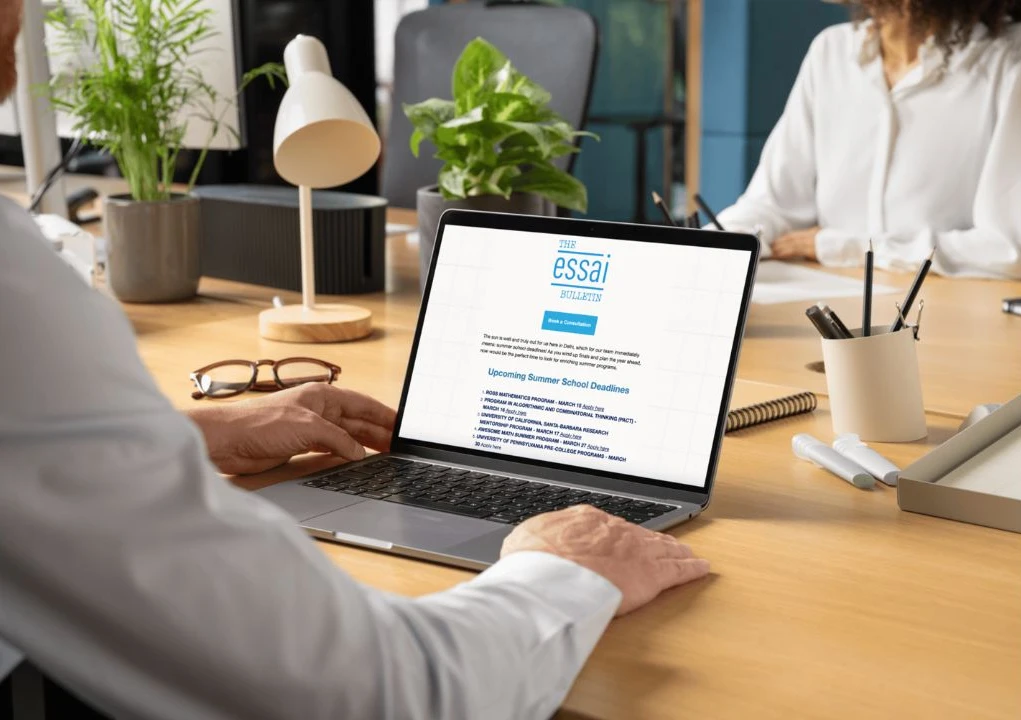When it comes to Ivy League admissions, every touchpoint matters.
While alumni interviews may be labelled “informal,” make no mistake, they can influence final decisions, especially when applicants are on the edge.
These interviews provide a rare opportunity to demonstrate authenticity beyond the Common App, test scores, and teacher recommendations.
According to a 2019 NACAC report, approximately 54% of colleges consider interviews to have at least “moderate importance” in the admissions process.
However, for Ivy League schools, the alumni interview isn’t about grilling candidates; it’s about exploring their personality, character, and fit.
Let’s break down the seven most common mistakes students make during these interviews—and how you can avoid them to stand out for all the right reasons. We’ll also share actionable solutions to help you avoid these pitfalls and shine when it matters most.
1. Treating the Interview Too Casually
Mistake: Showing up underdressed, unprepared, or speaking too informally.
Why It Hurts: Ivy League alumni interviews, while non-evaluative in most cases, still reflect your professionalism and seriousness. Alumni often write feedback reports that admissions officers read. If you treat the interaction like a coffee chat with a friend, you may signal a lack of maturity or interest.
Real Case: A former Yale interviewer noted on College Confidential that one student showed up late in a hoodie, answered with slang, and didn’t ask any questions, this didn’t “kill” their application, but it certainly didn’t help.
What to Do Instead:
- Dress business casual or cleaner depending on the setting (Zoom, café, office).
- Be punctual. Even five minutes late is a red flag.
- Speak formally but naturally, avoid slang or over-familiarity.
2. Over-Rehearsing or Sounding Robotic

Mistake: Memorizing “perfect” answers and repeating them like a script.
Why It Hurts: Alumni aren’t interested in your resume; they already have it. They want to know you. If you sound like you’re reading answers off a prep sheet, it feels disingenuous and rehearsed.
Ivy-Specific Insight: Columbia’s alumni interview guidelines emphasize that the conversation should be “relaxed and open-ended” to allow interviewers to assess qualities like curiosity, initiative, and personality.
- Practice key talking points, but maintain a conversational tone.
- Prepare examples from your life, not just accomplishments.
- Let your passion and personality show, even if it’s not perfect.
3. Failing to Research the School’s Values
Mistake: Saying things like “It’s a top school” or “It has great academics.”
Why It Hurts: Although Ivy League schools are all prestigious, each has a distinct culture. Alumni want to know why their school is the right fit for you, not just any Ivy.
Example: “UPenn has a great business program” is vague. Mentioning the Wharton Social Impact Initiative shows a deeper understanding.
How Essai Helps:
Essai mentors guide you in identifying what matters most to you and how it aligns with each Ivy’s values and programs. We help you craft specific, thoughtful responses that reflect genuine fit, so you stand out in every alumni interview.
What to Do Instead:
- Research programs, culture, and values in depth.
- Practice authentic, school-specific answers with Essai’s expert feedback.
4. Lack of Curiosity or Questions

Mistake: Saying “I don’t have any questions” when prompted.
Why It Hurts: This suggests a lack of interest or inadequate preparation. Ivy League interviews are as much about two-way engagement as they are about evaluation. Alumni want to feel you’re genuinely excited.
Harvard Alumni Tip: Alumni interviewers often say they remember students who ask thoughtful questions about their personal experiences, academic environment, or alumni network, not just basic FAQs.
What to Do Instead:
- Prepare 3–4 meaningful questions in advance.
- Ask about their experiences on campus, specific professors, or any unexpected challenges they encountered.
- Avoid questions you can easily find online (like “What’s the average class size?”)
5. Underselling or Overhyping Yourself
Mistake: Either being overly modest and hiding achievements or coming off as arrogant and self-congratulatory.
Why It Hurts: Ivy League schools value confidence with humility. Underselling makes you forgettable; overhyping feels inauthentic or off-putting.
Example: Instead of saying, “I’m the best debater in my state,” say, “I’ve had the opportunity to lead my team to a national championship, which taught me about strategy and collaboration.”
What to Do Instead:
- Frame achievements with context and reflection.
- Use the STAR method (Situation, Task, Action, Result) to share meaningful stories.
- Let your impact speak louder than your titles.
6. Failing to Reflect on Failures or Growth
Mistake: Avoiding tough questions or trying to appear flawless.
Why It Hurts: Ivy League schools value students with resilience and a growth mindset. If you can’t reflect on setbacks or how you’ve evolved, you risk seeming rigid or superficial.
Real Insight: A Princeton alumnus interviewer once said, “I love when students can admit they failed and learned something. That’s maturity.”
How PIPPAMS Helps:
Through the PIPPAMS platform, students regularly track their extracurricular journey and personal development over time. By reflecting on their challenges, milestones, and lessons learned, they gain structured insight into how they’ve grown, which becomes incredibly useful when preparing for tough interview questions. This kind of reflection isn’t just great for Ivy League interviews; it’s a life skill.
What to Do Instead with PIPPAMS:
- Use your activity log and reflections to identify moments of challenge and growth.
- Prepare honest, thoughtful stories that highlight your adaptability.
- Show interviewers you’re constantly learning not just achieving.
7. Ignoring the Human Side of the Interview
Mistake: Focusing only on academics or achievements without letting your personality shine.
Why It Hurts: Ivy League alumni want to know if they’d enjoy having you as part of their community. If the conversation lacks warmth, humor, or sincerity, it’s hard to form a connection.
What Yale Looks For: Yale’s admissions office explicitly states they seek “engaged citizens” and students who will “contribute to the community in meaningful ways.”
What to Do Instead:
- Share hobbies, quirks, or passions outside academics.
- Talk about a book that moved you, a moment that shaped you, or a personal cause you care about.
- Smile, make eye contact, and be present, not robotic.
Bonus: Real Interviewer Insights From Ivy League Alumni
To give you even more real-world perspective, here are direct insights from actual Ivy League alumni interviewers:
Harvard:
“I want to feel like I’m talking to a peer who is curious, open-minded, and engaged—not a resume machine.”
— Harvard Class of ’91, alumni interviewer since 2014
Cornell:
“I once interviewed a student who talked about beekeeping and how it connected to environmental policy. It wasn’t her major, but I still remember her years later.”
— Cornell CALS grad, alumni volunteer
Dartmouth:
“We look for students who light up when talking about something—not just those who tick all the boxes. Be human.”
— Dartmouth Class of ’02, alumni interviewer
Final Tips for Ivy League Alumni Interviews
- Be yourself, but your best self. Don’t put on a persona. Share your thoughts, dreams, and values honestly.
- Follow up. Always send a polite thank-you email that mentions a moment from your conversation.
- Don’t panic if you don’t get one. Some applicants are not offered interviews due to geography or availability it doesn’t mean anything negative.
- Remember it’s a conversation, not an interrogation. Make it memorable, thoughtful, and enjoyable.
Conclusion: The Alumni Interview is a Mirror, Not a Test
Ultimately, Ivy League alumni interviews aren’t just about you proving something. They’re about helping alumni see how you’ll fit into a centuries-old community of thinkers, dreamers, and doers. Avoiding these seven mistakes can elevate your interview from ordinary to unforgettable.
Want tailored prep for your Ivy League alumni interview?
Essai’s expert mentors, many of them Ivy League alumni, can help you craft your narrative, prepare for likely questions, and make your authentic self shine through.
Book a consultation today!
FAQ: Ivy League Alumni Interviews
1. Do alumni interviews matter for Ivy League schools?
Yes, especially in borderline cases. While not constantly “evaluative,” the alumni report is reviewed and can positively or negatively influence decisions.
2. What should I wear for a virtual Ivy League interview?
Business casual attire. Even if it’s on Zoom, looking polished shows respect and seriousness.
3. What if I don’t have much to say about the school?
Research. Read student blogs, alumni pages, and campus news. Look for aspects that genuinely resonate with you.
4. How long do Ivy League alumni interviews usually last?
Typically 30–60 minutes. Always be prepared for more extended discussions, especially if the conversation flows nicely.
5. Can I ask personal questions to the interviewer?
Yes! Alumni love talking about their experiences. Just keep questions respectful and focused on their time at the university.


